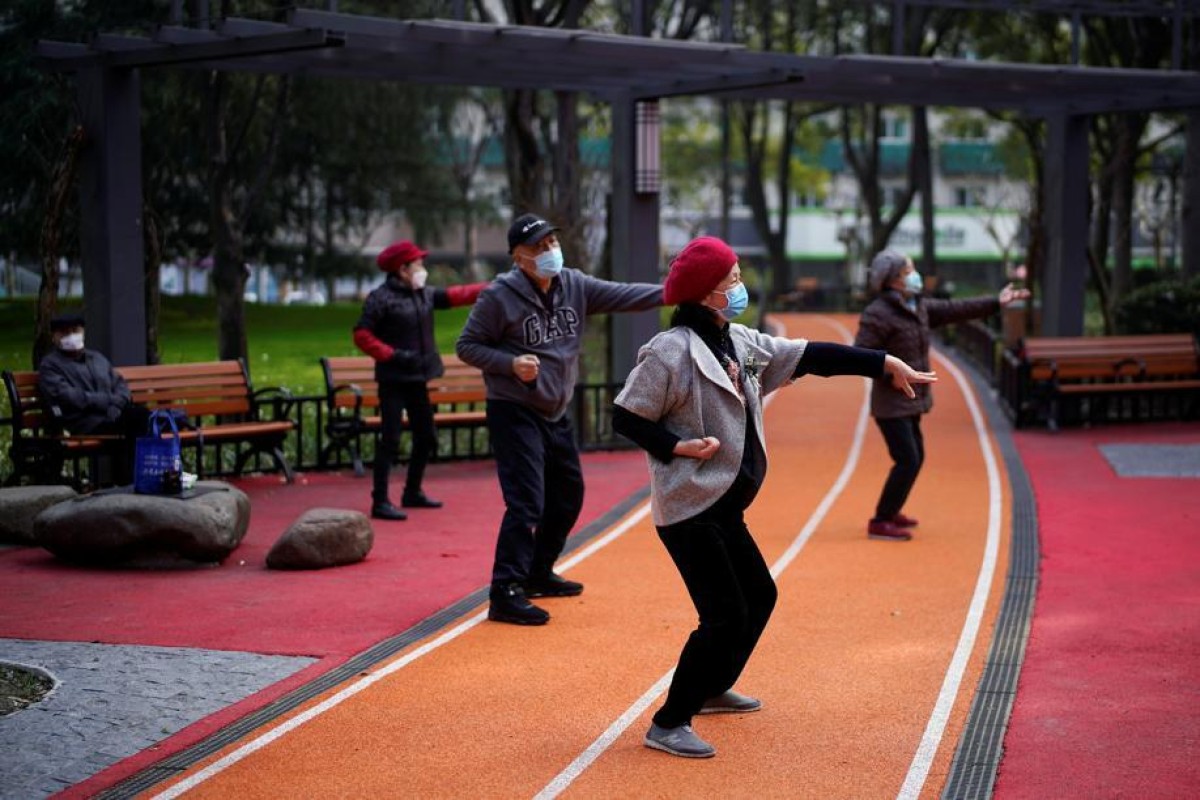
Air quality improved during China's Covid-19 lockdowns - and may have reduced hospital visits
- Lower levels of hazardous particles known as PM2.5 were likely to have resulted in an estimated 5,000 fewer hospital admissions and 60,000 fewer respiratory illnesses
- Researchers found that 24,000 to 36,000 early deaths due to air pollution may have been delayed because of lockdowns on the mainland
 People exercise in a Shanghai park in March. Air quality improved during China’s coronavirus lockdowns, as travel and industry ground to a halt. Photo: Reuters
People exercise in a Shanghai park in March. Air quality improved during China’s coronavirus lockdowns, as travel and industry ground to a halt. Photo: ReutersA drop in air pollution during China’s mass lockdowns to block the spread of Covid-19 earlier this year may have kept thousands of people out of hospital with other illnesses, new research has found.
Reduced levels of the tiny hazardous particles known as PM2.5 were likely to have resulted in an estimated 5,000 fewer hospital admissions and 60,000 fewer respiratory illnesses, like asthma attacks, from late January through February, according to a team of researchers from China, the US, Japan and the Netherlands.
The study comes as scientists around the world are using the pandemic as a rare chance to look at what happens to the environment and human health when travel and industry grind to a halt, significantly reducing air pollution.
Such pollution kills an estimated 7 million people annually, increasing mortality for heart disease, stroke, lung cancer, diabetes and pneumonia, according to the World Health Organization.
In China, which has aimed to improve its notoriously poor air quality in recent years, the health burden is steep. Air pollution caused an estimated 1.24 million deaths there in 2017, according to an analysis for the University of Washington in Seattle’s Global Burden of Disease study published this year.
“These results give us a window into what a cleaner world could look like – and the paths needed to achieve it,” said lead researcher Kazuyuki Miyazaki, a scientist in the Tropospheric Composition Group at Nasa’s Jet Propulsion Laboratory at the California Institute of Technology.
The peer-reviewed study, published this week in the journal Geophysical Research Letters, also had implications for outbreak management, the researchers said.
“This is the first study to show that the decreased air pollution during a lockdown can reduce demand for hospital beds and services and keep them from being overrun, which is one of the main short-term goals of flattening the curve,” said earth science professor Drew Shindell of Duke University in the US, one of the study authors.
Hong Kong health minister says mandatory Covid-19 testing may soon be necessary
China was the first country to impose sweeping lockdowns – shuttering industry and commerce and restricting travel – in an effort to contain the spread of the new coronavirus, first identified in the central city of Wuhan late last year.
The researchers found there was a 36 per cent reduction in nitrous oxide emissions from early January to mid February, which significantly reduced the levels of PM2.5 in the air. They used this data to project the impact on the number of hospitalisations linked to respiratory or cardiovascular illness.
Lao Xiang-qian, an associate professor at Chinese University of Hong Kong’s School of Public Health and Primary Care, said the study’s conclusions were convincing, given the well-established relationship between exposure to air pollution and poor health.
“Investigators might conduct a further study in future to confirm this finding, if they can get data on the number of respiratory diseases and hospitalisations,” he said.
Hong Kong's fourth wave of coronavirus could be sooner than we think
Several other studies have investigated the health impact of the decrease in air pollution during China’s lockdowns.
Researchers at the Hong Kong University of Science and Technology estimated that about 24,000 to 36,000 early deaths due to air pollution may have been delayed because of lockdowns on the mainland, in a July study published in the journal Nature Sustainability.
Lead researcher of that study He Guojun, an assistant professor of social science at the university, said that while lockdowns could have short-term health impacts due to improvement in air quality, they also “bring about significant health costs, particularly in the long run”.
These may arise from limited access to health care for those with chronic disease, as well as from the economic impact of lockdowns.